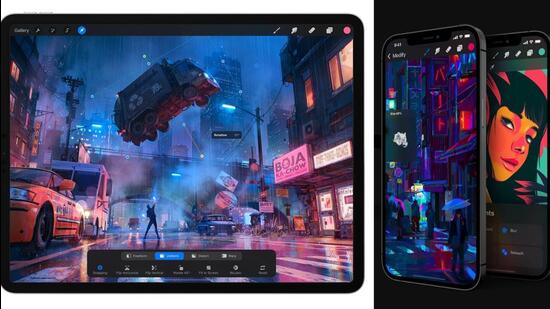Going against an overwhelming tide takes courage and clear thinking. For tech companies, and especially the creative platforms they’ve built, the advance of generative artificial intelligence (AI) has been unstoppable over the past year. Image and video editors, illustration and animation apps, even the photo gallery app in your phone are wrapped in an ever-thickening layer of AI. The outlier that immediately caught our collective attention is Australian tech company Savage Interactive. They develop the Procreate apps and insist they won’t build generative AI intelligence into those apps.

“AI is not our future” and “we’ll never get there” are the strongly worded claims of CEO James Cuda. But then comes an official statement that goes on to say: “Generative AI strips the humanity out of things. The technology is based on theft and is steering us towards a desolate future.” The company’s portfolio includes three apps: the popular illustration app Procreate for the Apple iPad, the animation app Procreate Dreams, which is also exclusive to the iPad, and the iPhone-optimized Procreate Pocket.
This would, at least for as long as it lasts (and we hope it lasts a long time), be in stark contrast to their immediate competition. This means that there are now two very different approaches in the industry, the other being exemplified by the examples of Adobe and Canva. The former has been steadily integrating Firefly’s generative AI capabilities into its apps like Photoshop, Illustrator and Lightroom. Canva has also made it clear that AI will also be incorporated into the Affinity art suite, something we’ve already seen extensively with the recent Magic Studio updates.
“I really fucking hate generative AI,” Cuda said in a video shared via Procreate’s official X handle. The video clearly conveys the message of the tech company that has been developing the ultimate illustration app for the iPad for years (it remained one of the best-selling paid apps on the App Store for the past 7 years) and was founded in 2011. “I don’t like what’s happening to the industry and I don’t like what it’s doing to artists. We will not introduce generative AI into our products,” Cuda adds.
Read also:Art and iPad: AR, algorithms and coding give artists more tools
Procreate says there will be no changes to their data and privacy policies either, meaning they won’t have access to artists’ creations. Adobe, one of Procreate’s main competitors, announced new terms of service this summer that would allow them to access any content created using their apps, “using both automated and manual methods” – but they have since clarified that user data is not used to train AI models.
If you’ve been following this space closely, you’ll realize that Procreate’s move clearly responds to the demands of many users and creatives. A few years ago, Japanese illustration app Clip Studio Paint, owned by Celsys, had to withdraw plans to integrate an AI image generator into the app.
Another reason Procreate remains popular with users is the one-time subscription method that dictates their premium play – think of it as a one-time, lifetime subscription. The Procreate app for iPad costs ₹1,299, while Procreate Pocket for the iPhone costs ₹599. A similar approach is followed with Procreate Dreams, the price is ₹1,999.
Cuda and Procreate are aware of the risks of their move. “In this technological onslaught, we could be an exception or risk being left behind. But we see this path less traveled as the more exciting and fruitful one for our community,” they say. No risk, no reward, as they say.
The fact is that digital art platforms currently seem to be taking two very different approaches – one that relies heavily on AI and one that doesn’t. There is now more choice for users to choose what they are most comfortable with. However, Procreate’s highly publicized announcement that it will shun generative AI could potentially provide momentum for other players in the industry to follow suit.

